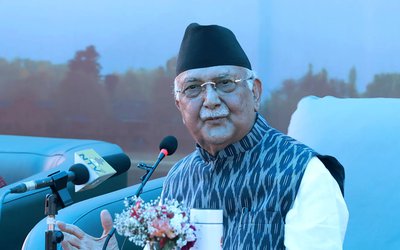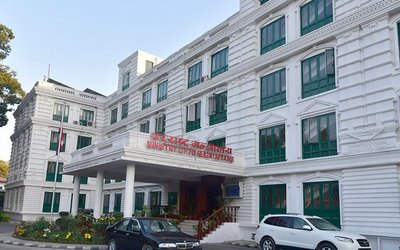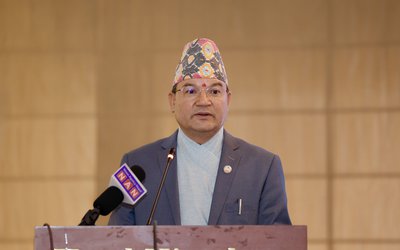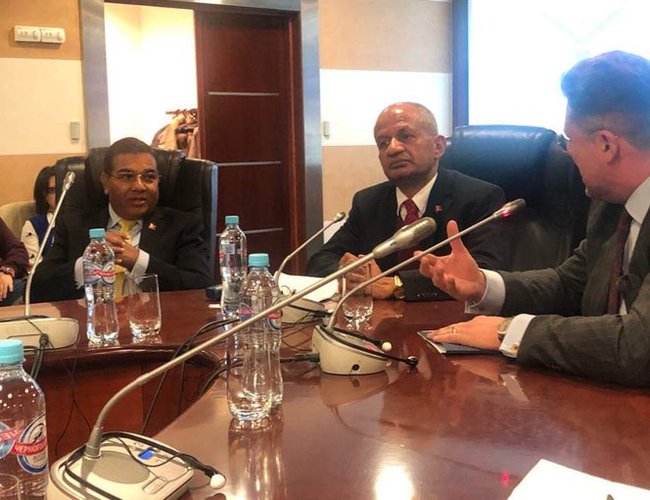
Foreign minister Pradeep Kumar Gyawali said that Nepal’s foreign policy orientation is to enhance friendly relations with major powers such as the Russian Federation, development partners, and other friendly countries.
Minister Gyawali said that Nepal and the Russian Federation are old and good friends. He said that ever since the establishment of diplomatic relations in 1956, we have maintained cordial and friendly relations. This year marks the 63rd anniversary of the establishment of formal ties. I would like to extend warm felicitations to all of you on this happy occasion.
Addressing a program organized by Moscow State Institute of International Relations (MGIMO), Minister Gyawali said that Nepal greatly values the bond of friendship it enjoys with the Russian Federation.
“Our relations have progressively evolved over the years to cover political, economic, social, cultural and educational dimensions. It is a multidimensional partnership. Continued engagements at various levels and mutual cooperation in the areas of common interest have nurtured our friendship. Parliamentary and judicial exchanges and frequent visits by high officials of both countries have contributed to widening the scope and enriching the substance of our relationship.
The objective of my visit this time, in my capacity as Foreign Minister of Nepal, has been to bolster trust, deepen political understanding, promote economic, commercial and cultural ties and strengthen collaboration in dealing with regional and global issues of common concern,” said minister.
“We agreed to work together to take our relations to the next level through enhanced political engagement and promotion of mutually beneficial cooperation in diverse fields. We underlined the importance of exchanging high-level visits between the two countries, activating established a bilateral consultation mechanism and concluding a host of agreements and understanding to further cooperative partnership.”
Excerpts of The statement
As you are aware, my visit has taken place in the fundamentally changed national context of Nepal. Nepal’s long political transition following a decade-long armed conflict has ended. A new democratic and inclusive Constitution promulgated in September 2015 has settled long-standing political issues. The elections held in 2017 under the provisions of the Constitution have produced a stable government with over two-thirds majority in the Parliament the first time in two decades, thereby ending the cycle of political instability. Policy clarity and consistency in development efforts have been realized and the ‘Prosperous Nepal, Happy Nepali’ has been defined as a country’s overarching national aspiration. A clear sense of direction and commitment in the conduct of an independent and balanced foreign policy based on the notion of ‘amity with all, enmity with none’ has underpinned our worldview.
This visit is also about Nepal’s commitment to reenergizing all aspects of multi-faceted Nepal-Russia friendship. Needless to say, the full spectrum of our friendship is much more than formal contacts. There has been an increasing level of cultural cooperation and interactions engaging the private sector and other people-to-people exchanges. Students, entrepreneurs, diaspora, scientists, artists, mountaineers, tourists and importantly the academia from both countries have made significant contributions.
People-to-people relations give added value to Nepal-Russia relations, which began with the visit of the renowned Russian Scholar Ivan Pavloviech Minayev to Kathmandu in 1875. It has been reinforced by Russian literary icons like Tolstoy, Chekhov, Gorky, and Pushkin who have great influence in Nepali literature. It is heartening that many Russians have an attraction towards the Hindu, Buddhist and Eastern philosophy.
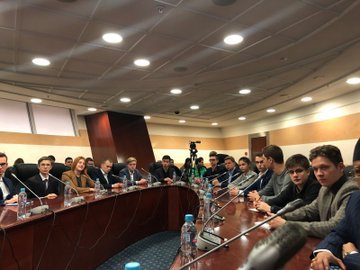
Some Nepali and Russian nationals are residing in each other’s countries for a variety of reasons. I thank the Russian community for hosting Nepali nationals and supporting them. I also express my sincere thanks to the friendly Russian people for their help in the aftermath of the devastating earthquake in 2015. As Foreign Minister Lavrov told yesterday, the true friendship came into full play when Russia promptly and spontaneously sent a team of medical doctors along with humanitarian supplies for rescue and relief.
It is encouraging to witness continued progress achieved by the Russian Federation over the decades. In the fields of technologies, infrastructure, innovation and research, the progress has been remarkable. The Government, people and the academic circle of Nepal greatly appreciate these and many other stellar achievements made by the Russian Federation.
The steady course is taken by Russia in achieving sustainable economic development, industrialization and high-end technological advancement have been a glaring examples of its perseverance and dedication. Over the decades, the Russian partnership with the global south has been increased.
Nepal sincerely appreciates support and cooperation extended by the Russian Federation in industrial and infrastructure development in the past. The technical cooperation has helped significantly lay the groundwork for Nepal's economic development.
Nepal has learned from Russia the development planning model. Nepal adopted systematic and planned development efforts since 1956 and we have in place the 15th edition of the Development Plan. The best practices of the Soviet Planning model have helped Nepal shape its planning framework.
On a different note, Russian scholarships on higher education for Nepali students and public-sector professionals have been highly useful. There are a number of Nepali nationals trained in the Russian Federation occupying higher positions in politics, administration and the private sector today.
Nepal and the Russian Federation have been working closely in multilateral forums as well. One important avenue I would like to mention is the United Nations, which Nepal considers to be the cornerstone, custodian, and emblem of multilateralism. With an emphasis on a just and balanced world order for peace and stability, Nepal believes in multilateralism and rules-based international order.
At a time when the world is facing multiple challenges, the Russian initiatives in the global fight against terrorism, cybercrime, climate change, and other pressing global issues have been commendable. Let me underline that primacy of international law and the value of world peace in the conduct of foreign policy help reduce tension and conflict.
Nepal has been contributing to the maintenance of international peace and security by consistently and substantially supporting UN peacekeeping operations. Our troops are presently working in 15 out of 16 peacekeeping missions around the world and mostly in the troubled parts of the world. Russia, being a permanent member of the UN Security Council, has an important role to fulfill, together with other members, that peacekeeping missions accomplish their objectives in a timely manner within the given mandate. We call for enhanced consultation and coordination with TCCs/PCCs when making important decisions on peace missions.
Regional cooperation is one of the defining attributes of international relations today. The Shanghai Cooperation Organization (SCO), funded jointly by the Russian Federation and other friendly countries in the region, is a new opportunity for institutionalizing a long-lasting environment for peace and prosperity in the region, and beyond. As a Dialogue Partner, Nepal has found SCO as an additional platform for engaging in mutually beneficial projects in a wide area including trade, transit, investment, energy, agriculture, small and medium enterprises, and culture. We are looking for full-fledged membership in the organization to enhance our contribution. We are thankful to the Government of the Russian Federation that it was in Ufa, Russia, the decision to grant Nepal the dialogue partner status was taken.
Nepal has been collaborating, directly or indirectly, on matters of common interest with the Russian Federation in all available platforms. We will continue this in the future.
Let me inform you, in this context, the Government of Nepal has established a permanent dialogue forum, Sagarmatha Sambaad (Mt Everest Dialogue) to deliberate on contemporary issues of national, regional and global significance. The first episode of this international dialogue platform will be devoted to the theme ‘climate change mountains and future of humanity’ and will be held on 2-4 April next year in Kathmandu. This will provide yet another opportunity for Nepal and Russia to strengthen partnerships in the collective interest of humanity.
Never colonized and subjugated, Nepal has always remained an independent nation. This speaks of our glorious history and evolution as a nation.
Our foreign policy orientation is very much influenced by this legacy. As I stated earlier, we pursue an independent, non-aligned, balanced foreign policy based on the philosophy of friendship and cooperation with all countries in the world. We do not believe in enmity. We do not nurture ill feelings towards anyone.
The UN Charter, the Panchasheel—the five principles of Peaceful Coexistence, non-alignment, respect for international law, value for world peace guide our foreign policy. We believe that respect for every country’s sovereignty, territorial integrity and independence and non-interference in the domestic affairs of other countries are the essential ingredients of a healthy inter-state relationship.
As with any other country, Nepal also gives priority to its relationship with its neighborhood and extended neighborhood. We have defined that our relationship with neighbors and other countries is based on the principle of sovereign equality, mutual respect, and benefit. Guided by this principle, the present Government has made substantial efforts to enhance and consolidate friendly ties and cooperative partnerships with neighbors and other friendly countries. It is our principled commitment which we are translating into action that we will not let our territory to be used against the interest of our neighbors and any other friendly nation. This has helped us earn confidence and trust of neighbors.
Our immediate neighbors happen to be the world’s two most populous countries and the fastest-growing economies. It gives Nepal ample prospects for its economic development. We have the potential to be a vibrant bridge connecting the two sides for common benefits.
As a region full of potentials, diversity, and challenges, South Asia should continue to engage in promoting the collective interest with the utmost sense of regional solidarity, mutual respect and accommodation divergent views. We want peace and stability in our region and beyond. We believe that all differences can be resolved amicably through peaceful means.
Major powers, such as the Russian Federation, development partners, and other friendly countries are in the priority of our foreign policy orientation. We have significantly enhanced our partnership with this group of countries. We are committed to further widen and deepen our relationship for mutual benefit. These countries are an important source of our development financing and trade relationship. Beyond neighborhood, they are also a source of inbound tourists and technology.
The labor receiving countries are also in our priorities, as a large number of Nepali migrant workers are living there for employment. We are trying to diversify our relations with them to cover such vital areas as trade, investment, tourism and transfer of technology.
Regional cooperation features prominently in our foreign policy priority. We want to promote meaningful regional cooperation for the collective well-being of the people in the region. We attach importance to SAARC and BIMSTEC as principal vehicles for regional cooperation in our region. As I said earlier, we want to enhance our engagement in SCO. We are also pursuing the objective of sub-regional cooperation within the framework of BBIN-Bangladesh, Bhutan, India, and Nepal. We are also a member of the Asian Cooperation Dialogue.
Our commitment to the UN Charter is unflinching. We are a strong supporter of multilateralism. As discussed earlier, the UN is an indispensable global institution for us as it is the only legitimate organization that is capable of dealing with a host of contemporary issues we face today. Ours is an international perspective that believes in the collective prosperity of mankind and rejects unilateralism. We stand for general and complete disarmament of all weapons of mass destruction. We support nuclear-free zones and peace zones. We unequivocally condemn terrorism in all its forms and manifestations.
We call for a just, harmonious, inclusive and peaceful world order where all nations enjoy their rights while fulfilling their obligations in good faith.
Economic diplomacy has been a key component of our overall diplomacy. We are building economic partnerships with friendly countries focusing on trade, investment, tourism, technology transfer, climate financing and decent jobs for migrant workers. Our diplomatic missions have been tasked to promote economic diplomacy to support our national drive for rapid yet sustainable development.
Economic transformation is our most important national task ahead. We are still an LDC. We have additional difficulties as well. We are a country emerged from conflict and we are also landlocked countries. This sums up the nature of our development challenges, which are of course manifold and complex.
Development is a national responsibility and we are fully aware of it. But our domestic resources are not sufficient to overcome our huge development challenges. And, we do not have the luxury to wait for long, as we are lagging behind. We have to quicken the pace.
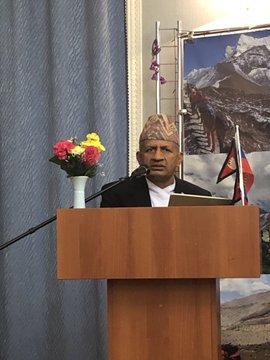
Our immediate goal is to graduate from LDC and become a middle-income country by 2030 which is also the deadline for the realization of SDGs. We have envisioned a long-term plan to achieve national prosperity by 2041. We will redouble our efforts to realize the national aspiration of ‘Prosperous Nepal, Happy Nepali’ within this timeframe.
Towards realizing the national aspiration, we will expedite the process of economic development. While internal resources are important, we count on international support and goodwill to enhance trade performance and seek an enhanced level of foreign direct investment. With a view to attracting foreign direct investment, we hosted an Investment Summit in Kathmandu in March this year. The Summit attracted a large number of prospective investors, including from Russia.
To make the business environment more attractive, friendly and competitive, investment-related laws and institutions have undergone constant reform. For example, the Foreign Investment and Technology Transfer Act (FITTA), Public-Private Partnership and Investment Act, Special Economic Zone (SEZ) Act have been promulgated and One-Stop Service has already been operationalized. Some other legislative reforms are in the pipeline such as Intellectual Property Rights Act.
Nepal’s friendly investment climate is evident from the World Bank’s Doing Business Report. Its latest report ranks Nepal among South Asia’s most favorable countries for ease of doing business.
Nepal has huge hydropower potentials. The exploitation of this precious resource can change the economic face of our country and the region. Investment in this sector is highly profitable as there is no problem of the market. The regulatory framework exists to facilitate the export of power generated in Nepal to India and Bangladesh.
Agriculture, tourism, mines and minerals, infrastructure development and IT are some of the areas where investment can be highly profitable. We have a liberal investment regime that allows investment in almost all sectors. The negative list is very short. We also offer a range of incentives that are unique and special to our context.
At this juncture, Nepal has a high hope of solidarity and support from our trusted friends. Your own involvement or encouragement to the business community to explore investment opportunities in Nepal would go a long way. Nepal is fully committed to protecting your investments. Political stability gives policy stability, which is the fundamental element to ensure predictability in the foreign investment regime.
At present, the level of trade and economic engagement between Nepal and the Russian Federation stands at a modest level. Rather than staying discouraged with the figures, I think it should be taken as an opportunity to attain a higher and swifter level of trade, commercial and investment engagements between us.
It is upon us–the Governments, the private sector, academia and people of all walks of life–to strive for meaningful and substantive cooperation in all sectors, including trade, investments, and tourism. There is a need to energize the role of Nepal-Russia Chamber of Commerce and Industries towards building business networks and kickstart doable projects in hand.
As you may be aware, Nepal is celebrating 2020 as Visit Nepal Year. An increased number of Russian friends to visit Nepal for tourism would greatly help the campaign. Nepal is a must-visit destination in one’s lifetime. Famous Poet Rasul Gamzatov was right when he described Nepal as ‘diamond yet to be crafted’. Investment in Nepal’s tourism infrastructure, which remains one of the lucrative areas, will also greatly help boost Nepal’s economy.
The Embassy of Nepal will work closely with you all, including the Non-Resident Nepali Association, Chambers, Friendship Associations and other partners, to make the Visit Nepal Year a success. As your good friend and also as the Foreign Minister, I would like to extend to you all a very warm invitation to visit Nepal at your convenience.
- Supreme Court upholds appointment of 52 officials
- Jul 03, 2025
- Weather Forecast: Generally Cloudy In The Hilly Areas With Heavy Rainfall In Some Areas Of Bagmati And Koshi Province
- Jul 03, 2025
- MCA-Nepal Welcomes Continued U.S. Support for MCC Nepal Compact Implementation
- Jul 02, 2025
- Sutlej to sell electricity from Arun III to Uttar Pradesh
- Jul 02, 2025
- PHDCCI India-Nepal Centre Organises “India-Nepal Fintech Summit 2025” In New Delhi
- Jul 02, 2025

